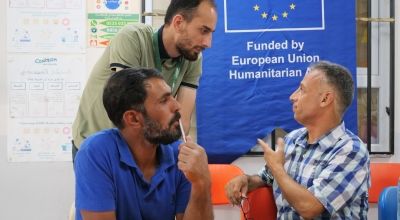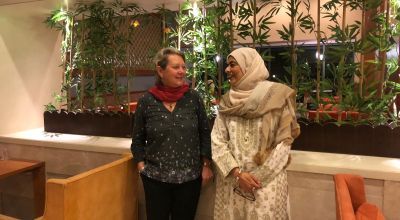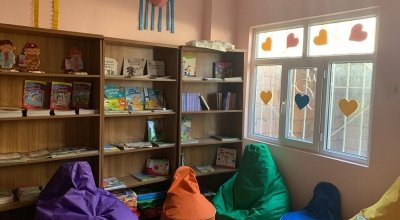
Read our 2024 annual report

Knowledge Hub
A bittersweet 'back to school' for Syrian children in Turkey
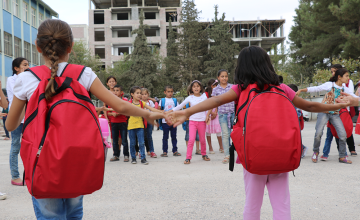
With the last schoolbook wrapped and the final layer of polish applied to new shoes, it’s finally back to school time for Irish children.
It’s an exciting occasion, one that is marked by a mixture of nerves and anticipation for the coming school year. However, for many young Syrian refugees in Turkey, the familiar 'back to school' ritual has been replaced with one of protracted frustration and uncertainty for their future.
According to UNHCR, there are over 2.7 million registered Syrian refugees calling Turkey their home, approximately 1.5 million of whom are children under the age of 17. Education for Syrian refugee children in Turkey is restricted and, with high numbers of children having missed up to three years of school, there is a real risk of them becoming a ‘lost generation’.
Limited educational opportunities
Through Concern’s work in education, it has become evident that approximately 15 per cent of second class students – that’s eight year old and nine year old children – cannot read. Concern has also observed a wide disparity in reading performance.
At first glance, this may paint a grim picture for the future of Syrian refugee children living in Turkey. However, there is cause for optimism. In spite of the trauma and unprecedented level of school interruption experienced by students, their results can and will improve - but support is required.
This is where the importance of Temporary Education Centres becomes clear.
Initiated and run by the Turkish government, these schools aim to increase education in the short-term for Syrian refugees through the provision of supplies and a safe learning environment. Many of the teaching staff are also Syrian refugees, enabling them to support both Syrian refugee children and their own families. Adnan and Amira are two such teachers.
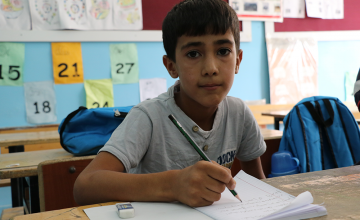
Emotional wellbeing
Adnan was a teacher for twenty-six years in his home in Syria, until the conflict forced him to flee to Turkey with his wife and three young children.
Now, he teaches music and philosophy in a Concern-supported TEC in south-eastern Turkey, funded by the European Commission Children of Peace initiative. His family are dependent on the monthly salary he receives from Concern.
This funding also provides teaching and learning materials, infrastructure repairs, and teaching support.
The trauma of conflict and displacement, combined with students’ extended periods of absence from school, has had a significant effect on the emotional wellbeing of the children. Adnan notes that aggressive behaviour is regularly visible in the classroom, highlighting a need for increased psychosocial support.
“My main concern is that my children and all Syrian children can have access to school”
Though passionate about teaching and supporting Syrian refugees, the difficult circumstances they’re working in can pose a challenge to both the teacher and the student. Adnan is not alone in voicing this concern, with many teachers, including Amira, sharing his observation.
Inside the classroom, with help from Concern’s Teacher Mentors, Amira has developed techniques to manage the challenging behaviour presented by some of her students. Our mentors visit classrooms to discuss challenges and solutions, as well as coach teachers in improved practice. Amira says that she has found this particularly helpful.
“They are the children of my sad country”
A lifelong dream was fulfilled when Amira enrolled in college and began her educational career in her home province in Syria. Strongly influenced by a childhood teacher, she couldn’t wait to “be like her and follow in her steps”.
Despite her ever-increasing responsibilities at home while raising her six children with her husband, Amira remained committed to her teaching practice. Sadly in 2014, heavy-fighting moved into her area, initially forcing her to seek refuge elsewhere in Syria with her family before further insecurity brought them to Turkey.
Initially, the move to Turkey was extremely difficult. With no income and their limited savings rapidly depleting, the future looked bleak. Then, Amira secured a teaching position in the TEC in south-eastern Turkey.
Amira is delighted to be teaching again, yet she expressed similar concerns to Adnan regarding the psychological wellbeing of the young children in her classroom. Determined to support learning for all, she monitors and keeps in close contact with the families of students who are experiencing difficulties through WhatsApp, calls and face-to-face meetings.
“[I have found the mentor visits] helpful in teaching and solving problems quickly, helping both teachers and students.”
During the academic year, Concern supported 372 teachers responsible for over 6,000 students through incentives, teaching materials and in-classroom support.
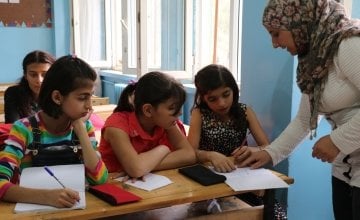
Safeguarding the right to education
Due to its effectiveness and increasing demand from teachers, we plan to expand our support of teachers and students in the upcoming academic year.
Returning to school is a bittersweet affair for many young Syrian refugees but with teachers such as Adnan and Amira, and continued strong commitment from the Turkish government, there is cause for some optimism.
We are committed to continuing our support of these children, safeguarding their right to education and paving the way to a brighter future.
Support our work with the world's poorest and most vulnerable communities by donating today.



